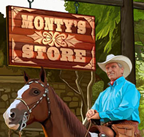Two days I worked with a horse that did not want to canter although he had done perfectly the day before. He was not lame and I thougt it was a psychological problem. At the end of the session I changed my opinion:
-he did not want to move for the games we usually do at the end of a session
-I realized that all other horses were dirty because they had wallowed on the pasture, he was perfectly clean
-His right anterior fetlock was a little warmer than the left
All little signs for a physical problem...
Any other interesting observations of the community?
Rudi
← back
Horse Behavior and Training
Physical versus psychological

Rewards
Subscribe to Equus Online University and become a part of Monty's worldwide mission to leave the world a better place for horses and for people too.
Students automatically gain access to special rewards, such as exclusive discounts at the Monty Roberts Online Shop. Visit Monty Roberts Online Shop.



A couple of thoughts....A possible mild inflammation in his leg that may have made him reluctant to canter and reluctant to roll due to the pressure needed to get up from the ground after rolling? Referred heat/pain from somewhere else? It seems he knows what he needs to do to make it better - rest it :-) A good example of how we should sometimes listen and trust our horses to know what is right rather than assuming they are being uncooperative?
It is my firm belief (and it has been solidified over the years)that when horses appear uncooperative they either fail to understand what is asked or they can't comply due to some sort of pain, stemming from stiffness, soreness or bad memories = anticipated pain: "I think this will hurt because it did so before."
Good comments above. Sounds like DOMS (delayed onset muscle soreness) to me, what do you think? Especially if it was a good workout the day before, so he was willing the first day but stiffened up the next day.
http://www.horsemart.co.uk/horse_advice/preventing-delayed-on-set-muscle-soreness-doms-in-/1729